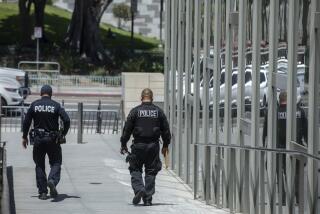Britain Faces Crisis of Confidence in Its Police Force as Genial Bobby Loses Stature
- Share via
LONDON — The genial “Bobby” policing the nation on foot with only his truncheon and a whistle to protect him may soon be another piece of British folklore.
Mention the police in today’s Britain and the images are more likely to be screaming sirens, guns and scandals--rather like most other places on the globe.
“Why I no longer have faith in the police,” said the headline in London’s Evening Standard.
Columnist Sophia Watson wrote that she no longer believes in “the lie I was brought up with, that police can help.”
Her London apartment, she reported, had been robbed four times in two months.
“We are so busy, my local police cry. Doing what? Not catching burglars,” Watson wrote.
Various factors lie behind a developing crisis of confidence in the nation’s police.
- Rising crime. It took 20 years for the crime rate to double from 1 million to 2 million offenses a year, but half that time to reach the present 5 million.
- Miscarriages of justice. Appeal courts have recently overturned convictions for several bloody Irish guerrilla bombings of the 1970s. Police evidence has also been challenged in other cases where detectives were under public pressure to get quick convictions.
- Firearms and tactics. Armed police went on 24-hour car patrol on London’s streets for the first time this year.
A survey in the Observer newspaper said that of all British men born in a single month in 1953, one in three had a criminal record by the time he was 30.
The survey also showed that in 24 hours Britain could expect two murders, 10 rapes, 50 other sex crimes, 50 cases of grievous bodily harm, 113 muggings, 2,800 burglaries and 1,200 car thefts.
The crime rate is still below the European average.
But “Britain has become a more lawless society in recent years,” says Alan Eastwood, chairman of the Police Federation, which represents 147,000 officers.
Police were being asked “to perform miracles with quite inadequate resources,” Eastwood said.
Police morale has sagged along with Britons’ faith in their constabulary. Both were dealt severe blows by the recent quashing of convictions in several high-profile cases.
Three Irishmen and a British woman, “The Guildford Four,” were cleared in 1989 of Irish Republican Army (IRA) guerrilla bombings in the town of Guildford after spending 14 years in jail.
The “Birmingham Six” were freed in March after 16 years on similar charges.
The West Midlands Serious Crime Squad was disbanded in 1989 amid allegations of police malpractice.
Demonstrators marched recently to demand freedom for the “Tottenham Three”--three men serving jail terms whose convictions for the murder of a policeman hacked to death in a 1985 riot at Tottenham in London are being re-examined.
Similar riots broke out earlier this year, with youths taking on the police with bricks and gasoline bombs.
Said one officer: “The blue uniform used to command respect. Now it’s a red rag to a bull.”
A Bobby walking the beat feels increasingly threatened when entering inner-city slums, and senior officers believe his value in responding to an incident is now questionable.
The police blame joblessness, poor housing and bad education for rising crime and for street gangs of young men with no better way to prove their manhood than to goad them into pitched battles.
“People now recognize that crime prevention cannot be left to the police alone,” said Home Secretary (interior minister) Kenneth Baker.
Chief constables want more funds for modern policing techniques, including computers and helicopters.
More guns are being issued to police in line with a rise in armed robberies.
More to Read
Sign up for Essential California
The most important California stories and recommendations in your inbox every morning.
You may occasionally receive promotional content from the Los Angeles Times.








